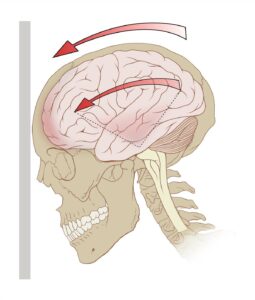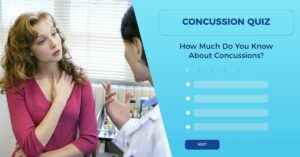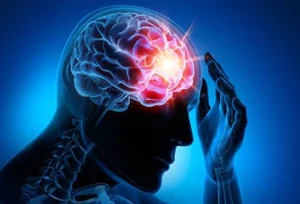Concussions are a hot topic in the news lately. But what is a concussion? How do you know if you or someone you know has one? And most importantly, what can be done to prevent and treat them? In this blog post, we will answer these questions and help you to a greater understanding of a concussion quiz!
Contents
What Is A Concussion Quiz?
 A concussion is a type of brain injury that can occur after a blow to the head or other traumatic event. Concussions are usually minor and do not require hospitalization, but they can still cause significant symptoms. A concussion quiz can help to assess whether someone has suffered a concussion and how severe it may be.
A concussion is a type of brain injury that can occur after a blow to the head or other traumatic event. Concussions are usually minor and do not require hospitalization, but they can still cause significant symptoms. A concussion quiz can help to assess whether someone has suffered a concussion and how severe it may be.
It is often difficult to know if someone has suffered a concussion, as the symptoms can be subtle and may not appear immediately after the injury. A concussion quiz can help to identify these symptoms so that they can be properly treated.
What Are The Symptoms Of A Concussion?
The symptoms of a concussion can vary depending on the individual and the severity of the injury. However, some common symptoms include:
- Headache
- Dizziness
- Nausea or vomiting
- Sensitivity to light or noise
- Difficulty concentrating or remembering things
- Feeling tired or sluggish
- Feeling down or irritable
If you think you may have a concussion, it is important to see a healthcare provider as soon as possible. The signs and symptoms of a concussion can last for days, weeks, or even longer. But you should know that most people who have a concussion recover quickly and fully.
How To Take A Concussion Quiz?
 When you think about concussions, you may think about football players getting knocked out during a game. However, concussions can happen to anyone at any time, even if you’re not playing a sport. So how can you know if you or someone you know has a concussion?
When you think about concussions, you may think about football players getting knocked out during a game. However, concussions can happen to anyone at any time, even if you’re not playing a sport. So how can you know if you or someone you know has a concussion?
There is a concussion quiz where you can answer some questions to help determine whether or not you have a concussion. To take the concussion quiz, you will need to answer the following questions:
- Have you ever been diagnosed with a concussion?
- Have you ever had a head injury that required medical attention?
- Do you have any symptoms of a concussion, such as a headache, dizziness, nausea, vomiting, confusion, or blurred vision?
- Have you ever lost consciousness due to a head injury?
- Do you have any other medical conditions that could increase your risk of a concussion, such as bleeding disorders or diabetes?
- Are you taking any medications that could increase your risk of a concussion, such as blood thinners or steroids?
- Do you have any family history of concussions or other head injuries?
- Are you a smoker?
- Have you ever had an MRI or CT scan of your head?
- Have you ever seen a neurologist or neuropsychologist for your head injury?
If you answer “yes” to any of these questions, you may be at risk for a concussion. However, only a doctor can diagnose a concussion. If you think you may have a concussion, it is important to see a doctor right away.
How Accurate Can A Concussion Quiz Be?
While a concussion quiz can give you a good idea about whether or not you may have a concussion, it’s important to remember that only a doctor can give you a definite diagnosis. Because the condition can be difficult to diagnose, it’s always best to err on the side of caution and see a doctor if you think you may have a concussion.
Moreover, many concussion quizzes focus on the immediate aftermath of a head injury. It’s important to remember that symptoms of a concussion can sometimes take days or even weeks to appear. If you think you may have suffered a concussion, it’s important to be vigilant for signs and symptoms over the coming days and weeks.
What Other Tests Are Involved In Concussion Diagnosis?
 Sometimes neuropsychological testing is involved in concussion diagnosis. This type of testing can give healthcare professionals information about how the brain is functioning and whether there are any areas of cognitive impairment. Additionally, neuropsychological testing can help to determine an athlete’s recovery timeline and provide insight into their risk for future concussions.
Sometimes neuropsychological testing is involved in concussion diagnosis. This type of testing can give healthcare professionals information about how the brain is functioning and whether there are any areas of cognitive impairment. Additionally, neuropsychological testing can help to determine an athlete’s recovery timeline and provide insight into their risk for future concussions.
The diagnosis of a concussion can be tricky and it is important to seek medical attention if you think you or someone you know may have suffered a concussion. If you have any questions about concussions, be sure to ask your healthcare professional.
What Are The Benefits?
A concussion quiz offers various benefits. It can help to improve your knowledge about concussions and their effects. Additionally, a concussion quiz can also help to raise awareness about the importance of seeking medical attention after sustaining a head injury.
Moreover, the test might be helpful in identifying people who are at risk for developing concussions. This is important because early diagnosis and treatment of concussions can minimize the severity of the injury and its long-term effects.
If you suspect that you or someone you know has sustained a concussion, it is important to seek medical attention as soon as possible. A concussion quiz can be a helpful tool in making the decision to seek medical attention.
What Are Some Drawbacks?
There are some common drawbacks of the test itself, these included:
- The test may not be able to pick up all concussions
- Susceptible to false negatives and false positives
- May not be able to tell the difference between a concussion and other types of brain injury
More often it is believed that the test is not perfect, but it is a good starting point to get an idea if someone has suffered a concussion. But if you think you or someone you know has suffered a concussion, it is always best to seek medical attention as soon as possible.
Conclusion
To conclude, a concussion quiz can help you learn more about this type of injury and how to prevent it. By taking the time to answer these questions, you can better understand how to protect yourself and your loved ones from a concussion. Thanks for taking the time to learn more about concussions!
For more information, please contact MantraCare professionals and consider Physical Therapy which has always been proven to help patients recover from pain. Hence, if you’re experiencing Back pain, Shoulder pain, Knee pain, Neck pain, Elbow pain, Hip pain, or Arthritis pain, a physical therapist at MantraCare can help: Book a physiotherapy session.


